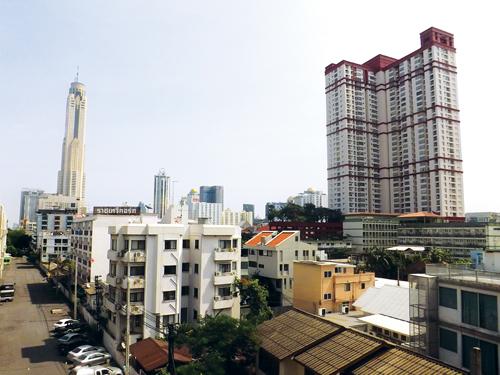No cooling measures needed in BKK

PHUKET: As concerns of a real estate bubble escalate, the Bank of Thailand (BOT) recently asked commercial banks to become more cautious about mortgage lending, particularly to borrowers who are suspected of buying houses or condominiums for speculative purposes.
While the BOT’s position is reasonable, as easy lending can inflate real estate bubbles, cooling measures are not needed at this stage, according to Jones Lang LaSalle, a professional services firm specializing in real estate.
“As the Thai stock market has heated up and the baht continues to strengthen, some economists in both the public and private sectors have voiced their concerns over possible bubbles in Thailand’s real estate markets. This concern is probably based on an assumption that many people who have made profits from the stock market may invest in the housing or condominium market. However, there haven’t been any clear signs of a bubble in Bangkok’s condominium market to-date,” said Mrs Suphin Mechuchep, managing director of Jones Lang LaSalle.
“A real estate bubble can occur when there is excess demand from speculative buyers and abundant liquidity through borrowing that drive property prices to levels well above their fundamental economic value.
“Bubble conditions can also be caused by developers themselves, undertaking development without proper market studies and planning, leading to overbuilding. However, our monitoring of Bangkok’s core and central condominium market shows that the aforementioned conditions do not presently exist,” said Mrs Suphin.
Despite the strong growth of new supply, prices of condominiums in both completed buildings and off-plan projects in Bangkok continue to rise. However, the price increases have been gradual and driven largely by sustained demand expansion, improvements in product quality and offering, as well as rising development costs.
While it is hard to identify the actual percentage of speculators in the condominium market, the consensus is that some condominium projects by leading property developers attract a considerable number of speculators. These projects include those in the upper-mid-price segment located in prime locations, which show high potential to appreciate in price when construction is near completion or is complete.
However, these projects are generally few and far between, as actual profits on changes in condominium prices are unlikely to lure strong speculative demand. Overall, most buyers are end users who purchase the property for their own use and/or investors who look for an income-generating asset as a long-term investment.
On the supply side, most of the new projects are in the mid-price segment (75,000-100,000 baht per square meter), satisfying growing demand from both young, middle-aged and retirement-year buyers adopting a more urban lifestyle. In the luxury segment, new launches have slowed down over recent years, allowing the supply under construction to be absorbed by the market.
Going forward, prices of new condominium developments will continue to edge upward, mainly due to higher development costs, including land that is becoming scarcer to find in locations that are suitable for new development. In addition, new projects tend to offer higher-quality products in terms of both design and construction, which will contribute to higher prices.
“While the BOT’s request to commercial banks to become more cautious about mortgage lending is a sound initiative, we don’t think any cooling measures to curb property transactions are necessary at this stage, as there remains no clear sign of a bubble.
“Any measures to curb property transactions could simply undermine real estate demand as the intervention could eventually result in added costs to buyers, for whom affordability is ultimately the key issue,” Mrs Suphin concluded.
— Jones Lang LaSalle
Latest Thailand News
Follow The Thaiger on Google News:


























